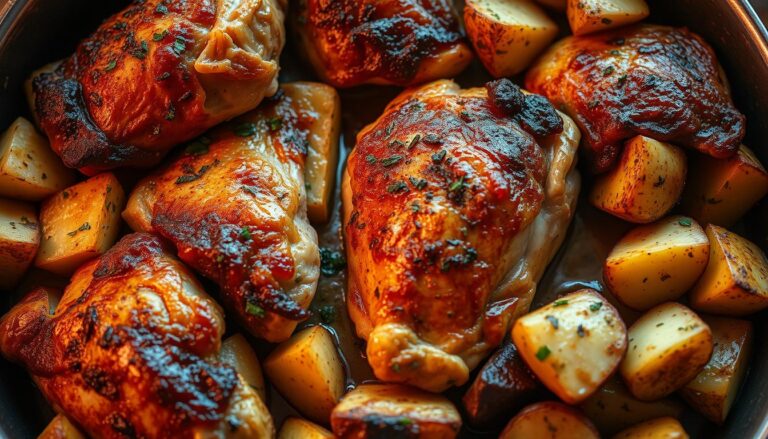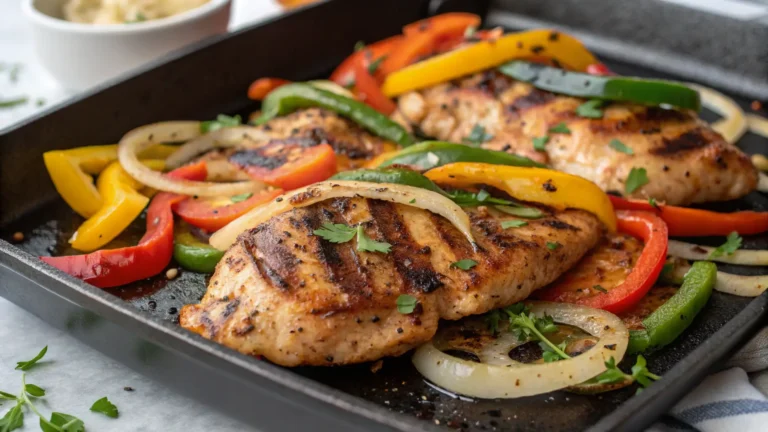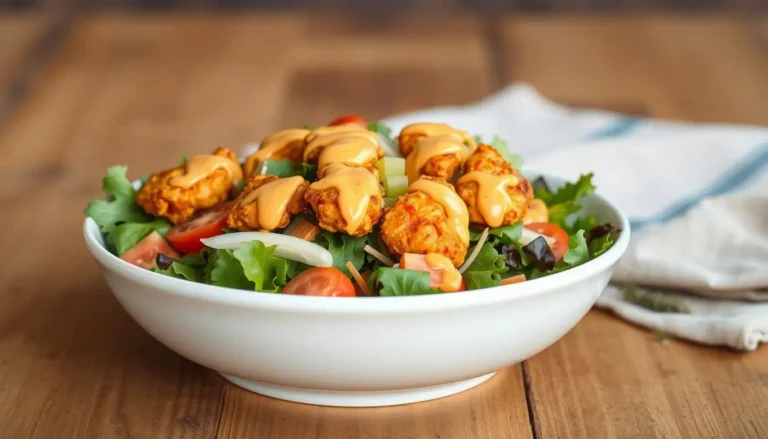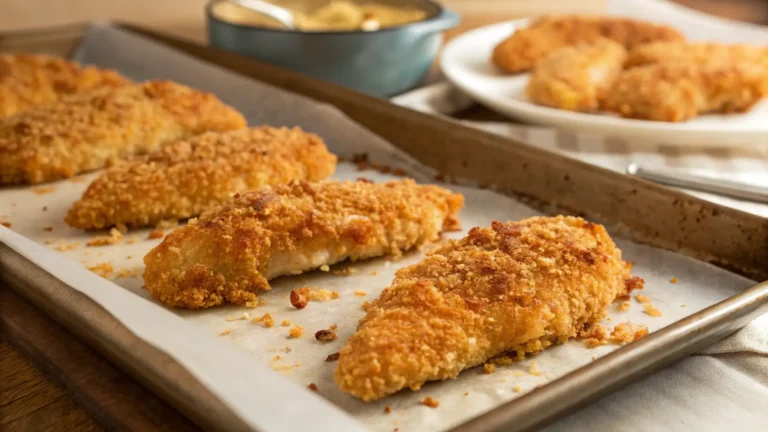Canes Chicken Recipe – Delicious and Easy to Follow
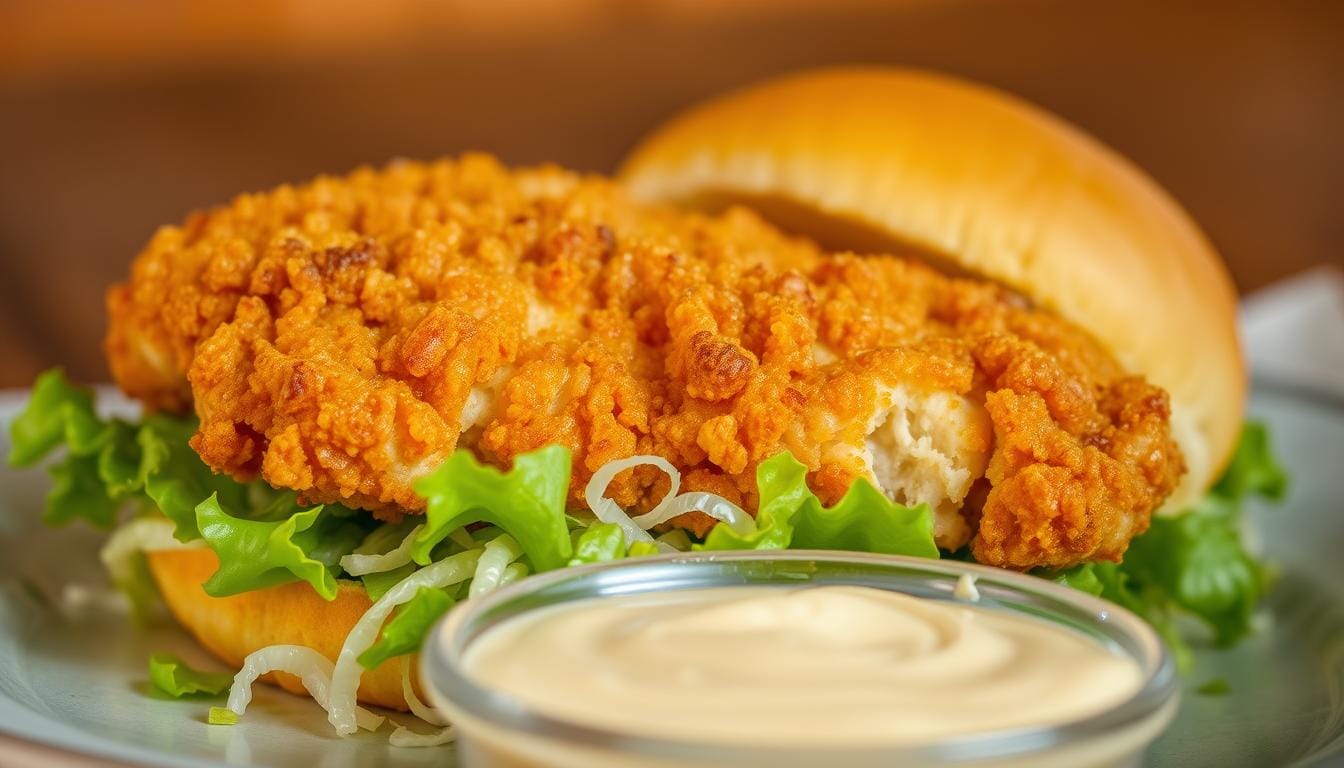
Table of Contents
Food lovers know the joy of crispy, golden chicken with the perfect sauce. For years, people have wanted to make Cane’s chicken at home. Now, you can become a master of this recipe, whether you love cooking or fried chicken.
Raising Cane’s made chicken strips famous with their juicy, crispy chicken and legendary sauce. Their secret? Perfect marination, precise breading, and that unforgettable sauce. It’s what keeps fans coming back.
This guide will show you how to make real Cane’s chicken at home. You’ll learn about the right ingredients and how to bread it perfectly. You’ll get the secrets behind those famous chicken strips.
Key Takeaways
- Learn the authentic Cane’s chicken recipe technique
- Understand the importance of proper marination
- Master the perfect breading method
- Discover how to make Raising Cane’s sauce at home
- Create restaurant-quality fried chicken strips
Introduction to Cane’s Famous Chicken
Raising Cane’s has become a favorite for chicken lovers in the U.S. Their canes chicken recipe is known for being top-notch. It turns simple ingredients into a delicious treat that people love to come back for.

The Story Behind Raising Cane’s Success
Raising Cane’s started with a dream to serve the best chicken finger meal. They focused on quality, aiming to perfect their chicken. This dedication has helped them grow fast across the country.
- Established with a clear mission
- Focused on quality over quantity
- Rapid expansion across multiple states
What Makes Cane’s Chicken Special
The secret to Cane’s chicken is in how they prepare it. Each tender is marinated for 24 hours. This makes their chicken tender and full of flavor, unlike others.
| Characteristic | Cane’s Chicken Difference |
|---|---|
| Marination Process | 24-hour buttermilk bath |
| Breading Technique | Light, crispy coating |
| Signature Sauce | Proprietary recipe |
Raising Cane’s stands out because of their commitment to quality. Every chicken tender tells a story of culinary craftsmanship. They use the best ingredients and cooking methods for a consistently great meal.
Essential Ingredients for Authentic Cane’s Chicken
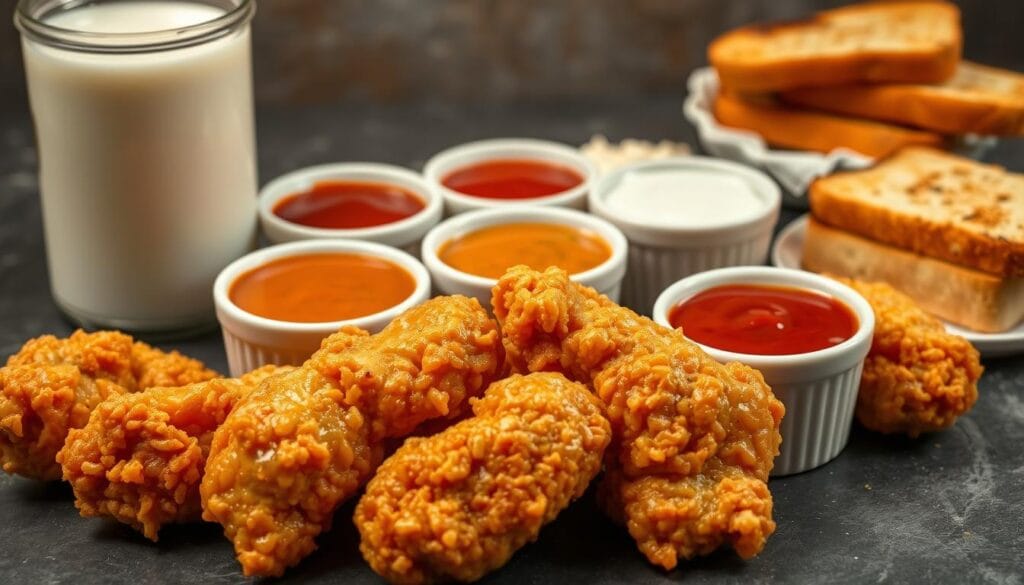
Starting your Cane’s chicken recipe is all about the right ingredients. You’ll need a special mix to make your chicken crispy and full of flavor.
Here are the must-haves for your cane’s chicken recipe:
- Boneless, skinless chicken breasts – the base of your dish
- High-quality buttermilk for tenderizing
- Creole or Cajun seasoning for authentic taste
- All-purpose flour
- Cornstarch for extra crispiness
- Baking soda to enhance browning
- Breadcrumbs for textural crunch
The secret to making great Cane’s sauce is balancing these ingredients. Buttermilk makes the chicken tender and juicy. The mix of flour and cornstarch gives it a crispy outside, just like Raising Cane’s.
“Great chicken starts with great ingredients” – Culinary Wisdom
If you can’t find something, don’t panic. Most ingredients have substitutes. The trick is to keep the right amounts and use the right techniques.
The Secret of Cane’s Signature Marinade
Creating an authentic cane’s chicken recipe starts with mastering the perfect marinade. The secret behind Raising Cane’s legendary chicken lies in its transformative buttermilk mixture and carefully selected seasonings.
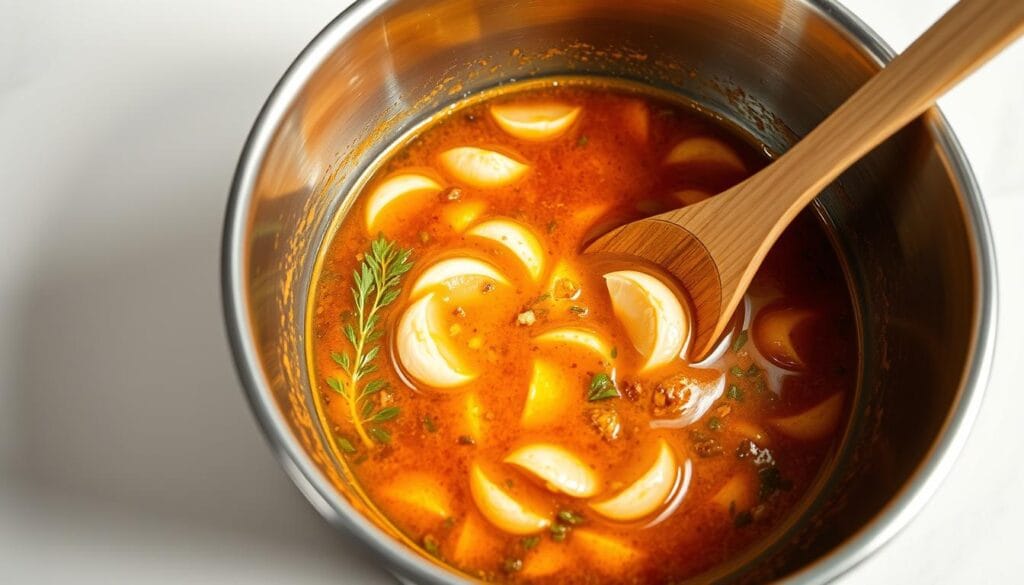
Marinating is crucial for developing deep, rich flavors and ensuring your chicken remains incredibly tender. The process requires precision and patience to achieve that signature Raising Cane’s taste.
Perfect Buttermilk Mixture Ratios
Your buttermilk marinade should balance carefully selected ingredients. Here’s a professional breakdown:
- 2 cups fresh buttermilk
- 1 tablespoon kosher salt
- 2 teaspoons black pepper
- 1 tablespoon Cajun seasoning
Optimal Marination Time
When learning how to make Raising Cane sauce and prepare their iconic chicken, timing is everything. Marinate your chicken for at least 2-4 hours, preferably overnight. This allows the buttermilk to break down muscle fibers, resulting in incredibly juicy meat.
Seasoning Components
The magic of Cane’s chicken recipe lies in its unique seasoning blend. Your marinade should include:
- Paprika for color and mild heat
- Garlic powder for depth
- Onion powder for complexity
- Cayenne pepper for a subtle kick
Pro tip: Always use fresh ingredients and mix your marinade thoroughly to ensure even distribution of seasonings.
Creating the Perfect Breading Mixture
Making the perfect breading mixture is key to a great canes chicken recipe. It’s all about picking the right ingredients and knowing their roles. This ensures your chicken gets that crispy, golden coating.
Your breading mixture is what turns regular chicken into a dish fit for a restaurant. It’s a mix of dry ingredients that adds flavor and texture. This combination is what makes the chicken so special.
Essential Breading Components
- All-purpose flour (primary base)
- Cornstarch (for extra crispiness)
- Baking powder (helps create light texture)
- Salt and pepper
- Cajun seasoning
Professional chefs start with the breading technique to make cane sauce. The right mix gives your chicken that golden, crispy outside. This is what makes Raising Cane’s so loved.
Breading Mixture Ratios
| Ingredient | Quantity | Purpose |
|---|---|---|
| All-purpose flour | 1 cup | Primary coating base |
| Cornstarch | 2 tablespoons | Enhances crispiness |
| Baking powder | 1 teaspoon | Creates light texture |
| Cajun seasoning | 1-2 tablespoons | Adds signature flavor |
When mixing your breading, combine all dry ingredients well. It’s important to get a mix that coats your chicken evenly. Sift the ingredients together to prevent clumping and ensure a smooth, even coating.
Pro tip: Let your seasoned flour mixture sit for 10-15 minutes before coating chicken to allow flavors to meld together.
Step-by-Step Cane’s Chicken Recipe
Making the perfect Cane’s chicken recipe needs precision and care. This guide will show you how to turn simple ingredients into a crispy, tasty meal. It’s just like the famous chicken tenders from the restaurant.
Preparation Process
First, gather all your ingredients and tools. You’ll need chicken tenderloins, buttermilk, flour, and seasonings. The secret to success lies in how you prepare and do the technique.
- Select fresh chicken tenderloins
- Make sure all ingredients are at room temperature
- Have a clean, organized workspace ready
- Prepare separate stations for coating
Coating Technique
The coating is key for that Cane’s crunch. Your dredging method will decide the chicken’s final texture.
- Mix dry ingredients in a shallow dish
- Make a buttermilk bath in another container
- Dip chicken in dry mixture first
- Submerge in buttermilk
- Coat again in dry mixture
Frying Instructions
Knowing how to fry is as important as making Raising Cane’s sauce. Perfect frying gives you that authentic taste.
| Frying Parameter | Recommended Setting |
|---|---|
| Oil Temperature | 375°F |
| Cooking Time | 4 minutes per side |
| Recommended Oil | Vegetable or Peanut Oil |
Drain the chicken on paper towels to get rid of extra oil. You’ll end up with a golden-brown, crispy outside and a juicy inside. It’s just like the classic Cane’s chicken recipe.
The Ultimate Cane’s Sauce Recipe
Making Raising Cane’s sauce at home is simpler than you think. This famous sauce is a favorite for chicken fans. Knowing what Cane’s sauce is can help you make it in your kitchen.
Cane’s sauce is creamy and tangy, making any chicken dish better. The secret is in the right ingredients and how you mix them. Here are the main parts:
- 1/2 cup mayonnaise
- 1/4 cup ketchup
- 1 teaspoon Worcestershire sauce
- 1/2 teaspoon garlic powder
- 1/4 teaspoon Creole seasoning
- Pinch of black pepper
Making the perfect Cane’s sauce needs careful mixing. Start by mixing mayonnaise and ketchup in a bowl. Then, add the rest of the ingredients slowly, whisking until it’s smooth. Pro tip: Let the sauce sit in the fridge for 30 minutes before serving to let the flavors mix well.
The key to making Raising Cane’s sauce is finding the right balance. You can tweak the seasonings to your liking. Some like more Worcestershire sauce for tang, while others prefer more Creole seasoning for spice.
“The secret is in the simplicity and the perfect blend of ingredients!” – Chicken Sauce Enthusiasts
Storing your homemade Cane’s sauce is easy. Put it in an airtight container in the fridge. It will last up to a week, giving you time to enjoy it with chicken, fries, or other favorite snacks.
Tips for Achieving the Perfect Crunch
To make the ultimate canes chicken recipe, you need to master a few key techniques. These methods turn regular fried chicken into a crispy, golden treat. The secret to that perfect crunch is in the cooking and preparation.
Getting your cane’s chicken recipe just right means focusing on two important things: oil temperature and how you dredge the chicken. These steps decide if your chicken will be crispy and delicious or soft and disappointing.
Oil Temperature Control
Keeping the oil at the right temperature is key for a crunchy exterior. Your oil should stay at 375°F. This ensures the chicken cooks fast and gets that crispy outside.
- Use a deep-fry thermometer for accuracy
- Avoid overcrowding the frying pan
- Allow oil to return to proper temperature between batches
Proper Dredging Technique
The double-dredging method is essential for a thick, crispy coating in your canes chicken recipe. This method builds layers of tasty breading. It keeps the chicken moist and adds a crunchy texture.
| Dredging Step | Purpose |
|---|---|
| First Dredge | Flour coating creates initial base layer |
| Buttermilk Wash | Helps breading adhere and adds moisture |
| Second Dredge | Creates thick, crispy exterior |
“The perfect chicken is all about technique and patience.” – Professional Chef
Pro tip: Shake off excess flour between dredging steps to prevent clumping and ensure an even, crispy coating.
Common Mistakes to Avoid
Mastering the cane’s chicken recipe needs precision and focus. Many home cooks face challenges that can ruin the crispy and flavorful dish. Knowing these common mistakes helps you make chicken as good as Raising Cane’s.
When making cane sauce and cooking chicken, several mistakes can mess up your dish:
- Insufficient Marination: Skipping or rushing the buttermilk marinade prevents deep flavor penetration
- Incorrect Oil Temperature: Using oil that’s too cool or too hot affects chicken crispiness
- Overcrowding the Fryer: Placing too many chicken pieces simultaneously reduces cooking effectiveness
- Uneven Breading: Inconsistent coating leads to patchy, unpredictable texture
Your oil should stay at 350°F for the best results. Use a kitchen thermometer to keep the temperature right. When breading your chicken, make sure the coating is even by pressing it gently onto the meat.
Patience is crucial in making authentic Cane’s chicken. Give enough time for marinating and pay close attention while cooking. These tips will help you avoid common mistakes and get that crispy, juicy chicken Raising Cane’s is known for.
Storage and Reheating Guidelines
Keeping your homemade canes chicken recipe tasty and crispy is key. You need to store and reheat it right. This way, you can enjoy your meal without losing its quality or safety.
Storing your chicken right is vital. It keeps the flavor and stops bacteria from growing. The right steps help your canes chicken stay delicious for later.
Refrigeration Best Practices
- Store chicken in an airtight container
- Keep refrigerated at 40°F or below
- Consume within 3 days of preparation
Optimal Reheating Methods
Reheating your canes chicken recipe should bring back its crispiness. Don’t use the microwave, as it can make the breading soggy.
| Reheating Method | Temperature | Recommended Time |
|---|---|---|
| Oven | 375°F | 10-12 minutes |
| Air Fryer | 370°F | 3-4 minutes |
Sauce Storage Tips
Your homemade raising cane’s sauce can be stored in a sealed container in the fridge. It stays flavorful for up to 7 days when kept cold.
Pro tip: Always use clean utensils when handling stored chicken and sauce to prevent contamination.
By sticking to these storage and reheating tips, your canes chicken recipe will stay as tasty as the first time you made it.
Serving Suggestions and Side Dishes
Make your Cane’s chicken recipe even better with tasty side dishes. These sides add to the crispy, flavorful chicken. They turn a simple meal into a full dining experience that meets all your cravings.
Cane’s signature side dishes are loved by chicken fans. Here are the classic sides that make your homemade Cane’s chicken stand out:
- Crinkle-cut Fries: These fries are crispy and golden, a must-have
- Buttered Texas Toast: It’s perfectly grilled and full of flavor
- Coleslaw: A crisp and refreshing side that balances the chicken’s richness
When making your Cane’s chicken recipe, think about these drinks to pair with it:
- Sweet tea
- Soft drinks
- Lemonade
To really get the Cane’s experience, remember the star – Cane’s sauce. This creamy, tangy sauce makes your chicken amazing. Make some homemade Cane’s sauce to drizzle over your chicken or use as a dip.
Pro tip: Serve your Cane’s chicken and sides on a wooden cutting board or rustic platter. It makes for a great photo that will wow your guests.
Nutritional Information and Portions
It’s important to know the nutritional facts of your homemade canes chicken recipe. This knowledge helps you make better food choices. You can enjoy tasty chicken while staying healthy.
When you make your canes chicken, pay attention to the nutrients. Chicken tenders offer a good mix of protein and important nutrients.
Calorie Breakdown
A typical serving of Cane’s chicken tenders (about 4 pieces) has:
- Total Calories: 329
- Protein: 20g
- Carbohydrates: 42g
- Fat: 8g
Serving Sizes and Recommendations
Here are some tips for portion sizes when making cane sauce and chicken:
- Individual Serving: 3-4 chicken tenders
- Family Portion: 8-12 chicken tenders
- Recommended Side Portions: 1/2 cup of sides
Pro tip: Change your portions based on your nutritional needs and how active you are. Your homemade canes chicken can be a tasty part of a healthy diet if eaten wisely.
Recipe Variations and Adaptations
Trying out different ways to make Cane’s chicken can make it your own. You can make it healthier or fit it to your dietary needs. These changes keep the dish’s signature taste.
Gluten-Free Cane’s Chicken Options
Want a gluten-free version of Cane’s chicken? Swap regular flour for these alternatives:
- Almond flour
- Coconut flour
- Gluten-free all-purpose flour blend
- Crushed gluten-free cornflakes
Baking Alternative to Frying
Want to use less oil? Baking your Cane’s chicken is a great choice. Heat your oven to 400°F. Place breaded chicken on a wire rack. Bake for 20-25 minutes, flipping halfway for a crispy coating.
Dairy-Free Modifications
Make a dairy-free version of Raising Cane sauce by replacing buttermilk with:
- Almond milk with apple cider vinegar
- Coconut milk
- Soy milk with lemon juice
Flavor Variations
Be creative with your Cane’s chicken. Try adding:
- Cajun seasoning for a spicy kick
- Herb blend for an aromatic twist
- Smoked paprika for a deeper flavor
The secret to a great Cane’s chicken is its crispy texture and taste. Adapt it to your liking while keeping its essence.
Conclusion
Mastering the Cane’s chicken recipe is within your reach. With the right techniques and attention to detail, you can recreate this beloved restaurant favorite in your own kitchen. The key lies in understanding each step of the process, from selecting quality ingredients to perfecting the signature breading technique.
Learning how to make Raising Cane’s sauce is just as important as nailing the chicken itself. By following the precise measurements and mixing methods outlined in this guide, you’ll be able to produce a sauce that rivals the original. Practice and patience will help you refine your skills and develop a deep appreciation for this iconic fast-food classic.
Your homemade Cane’s chicken recipe can become a crowd-pleaser at family gatherings and dinner parties. Remember that consistent oil temperature, proper marination, and careful coating are the secrets to achieving that crispy, golden-brown exterior that makes this chicken so irresistible. Experiment, have fun, and don’t be afraid to put your own spin on this beloved recipe.
We invite you to share your culinary adventures and personal twists on the Cane’s chicken recipe. Your feedback and experiences can inspire other home cooks to explore and enjoy this delicious dish. Embrace the joy of cooking and creating restaurant-quality meals in your own kitchen.
FAQ
What makes Raising Cane’s chicken so special?
Raising Cane’s chicken is known for its crispy outside and tender inside. This is thanks to a special buttermilk marinade and breading process. The light, crunchy coating and their famous Cane’s sauce make it stand out.
How can I make Cane’s sauce at home?
To make Cane’s sauce at home, you need mayonnaise, ketchup, Worcestershire sauce, garlic powder, and black pepper. Mix these in the right amounts for a tangy, creamy flavor. Adjust to taste and let it sit for a few minutes to blend the flavors.
What is the secret to Cane’s crispy chicken coating?
The secret is in three things: buttermilk marinade, a special flour mix, and the right oil temperature. Buttermilk tenderizes the chicken. The flour mix, with cornstarch and baking soda, makes it extra crispy.
Can I make Cane’s chicken in the oven instead of frying?
Yes, you can bake Cane’s chicken instead of frying. Preheat your oven to 400°F. Place the breaded chicken on a wire rack over a baking sheet. Bake until it’s golden and crispy. But, it won’t be the same as deep-fried chicken.
How long should I marinate the chicken?
Marinate the chicken in buttermilk for at least 2-4 hours, or overnight. This makes the meat juicy and flavorful.
What type of oil is best for frying Cane’s-style chicken?
Peanut oil or vegetable oil are best for frying. They have high smoke points and don’t affect the chicken’s flavor. Keep the oil at 350°F for a crispy exterior and a fully cooked interior.
How can I store leftover Cane’s-style chicken?
Store leftover chicken in an airtight container in the fridge for up to 3-4 days. To keep it crispy, reheat in an air fryer or oven at 375°F for 5-7 minutes. This is better than microwaving.
Are there gluten-free alternatives for the Cane’s chicken recipe?
Yes, you can use gluten-free flour blends or almond flour instead of regular flour. Cornstarch is a good binding agent. Make sure all ingredients are gluten-free. The goal is to get a similar texture and coating to the original recipe.
Have you given our recipe a try?
There are no reviews yet. Be the first one to write one.


